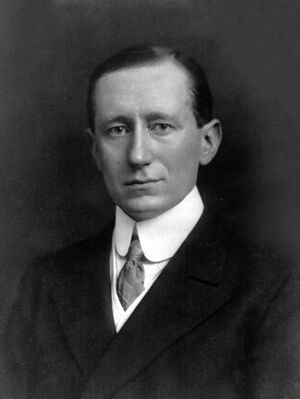Guglielmo Marconi (nonfiction): Difference between revisions
No edit summary |
No edit summary |
||
| Line 11: | Line 11: | ||
== Fiction cross-reference == | == Fiction cross-reference == | ||
* [[Gnomon algorithm]] | |||
* [[Gnomon Chronicles]] | |||
== Nonfiction cross-reference == | == Nonfiction cross-reference == | ||
* [[Karl Ferdinand Braun (nonfiction)]] | |||
* [[Maskelyne-Marconi affair (nonfiction)]] | |||
* [[Alexander Stepanovich Popov (nonfiction)]] | * [[Alexander Stepanovich Popov (nonfiction)]] | ||
External links: | External links: | ||
Latest revision as of 20:32, 3 December 2018
Guglielmo Marconi, 1st Marquis of Marconi (Italian: [ɡuʎˈʎɛlmo marˈkoːni]; 25 April 1874 – 20 July 1937) was an Italian inventor and electrical engineer known for his pioneering work on long-distance radio transmission, and for his development of Marconi's law and a radio telegraph system. He is often credited as the inventor of radio, and he shared the 1909 Nobel Prize in Physics with Karl Ferdinand Braun "in recognition of their contributions to the development of wireless telegraphy".
Marconi was an entrepreneur, businessman, and founder of The Wireless Telegraph & Signal Company in the United Kingdom in 1897 (which became the Marconi Company). He succeeded in making a commercial success of radio by innovating and building on the work of previous experimenters and physicists.
In 1929, the King of Italy ennobled Marconi as a Marchese (marquis).
In the News
Fiction cross-reference
Nonfiction cross-reference
- Karl Ferdinand Braun (nonfiction)
- Maskelyne-Marconi affair (nonfiction)
- Alexander Stepanovich Popov (nonfiction)
External links:
- Guglielmo Marconi @ Wikipedia
